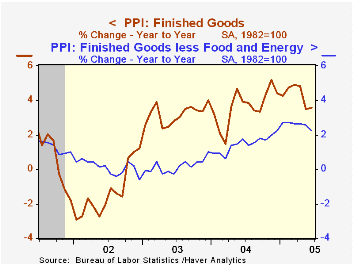 Global| Jul 15 2005
Global| Jul 15 2005Producer Prices Unexpectedly Weak
by:Tom Moeller
|in:Economy in Brief
Summary
The producer price index for finished goods was unexpectedly unchanged last month following the 0.6% decline in May which also was unexpected. Consensus expectations had been for a 0.4% rise in June. Excluding food & energy prices [...]

The producer price index for finished goods was unexpectedly unchanged last month following the 0.6% decline in May which also was unexpected. Consensus expectations had been for a 0.4% rise in June. Excluding food & energy prices were also surprisingly weak, falling 0.1% versus the expectation for a 0.1% rise.
Prices for core finished consumer goods fell 0.1% (+2.4% y/y) due to to a 2.0% (NSA, +1.4% y/y) decline in passenger car prices. Consumer durable goods prices overall fell 0.4% (+0.5% y/y). Showing strength, core consumer nondurable goods prices rose 0.3% (3.8% y/y) but capital goods prices fell 0.2% (+2.1% y/y).
Finished energy prices rose 2.0% (13.1% y/y) while finished food prices fell 1.1% (+0.1% y/y).
Intermediate goods prices recovered 0.1% of the prior month's sharp drop as energy prices rose 1.9% (15.0% y/y). Pricing weakness, however, was indicated by the 0.2% decline in core intermediate goods prices.
Crude prices fell another 3.3% due to the 3.1% June decline crude energy prices which has since reversed. Core crude prices added 4.3% to the May decline. Iron & steel scrap prices fell 22.1% (NSA, -15.5% y/y). During the last thirty years "core" crude prices have been a fair indicator of industrial sector activity with a 48% correlation between the six month change in core crude prices and the change in factory sector industrial production.
| Producer Price Index | June | May | Y/Y | 2004 | 2003 | 2002 |
|---|---|---|---|---|---|---|
| Finished Goods | 0.0% | -0.6% | 3.6% | 3.6% | 3.2% | -1.3% |
| Core | -0.1% | 0.1% | 2.2% | 1.5% | 0.2% | 0.1% |
| Intermediate Goods | 0.1% | -0.7% | 6.1% | 6.6% | 4.6% | -1.5% |
| Core | -0.2% | -0.3% | 4.9% | 5.7% | 2.0% | -0.5% |
| Crude Goods | -3.3% | -2.0% | 1.7% | 17.5% | 25.1% | -10.6% |
| Core | -4.3% | -3.6% | 5.2% | 26.6% | 12.4% | 3.8% |
Tom Moeller
AuthorMore in Author Profile »Prior to joining Haver Analytics in 2000, Mr. Moeller worked as the Economist at Chancellor Capital Management from 1985 to 1999. There, he developed comprehensive economic forecasts and interpreted economic data for equity and fixed income portfolio managers. Also at Chancellor, Mr. Moeller worked as an equity analyst and was responsible for researching and rating companies in the economically sensitive automobile and housing industries for investment in Chancellor’s equity portfolio. Prior to joining Chancellor, Mr. Moeller was an Economist at Citibank from 1979 to 1984. He also analyzed pricing behavior in the metals industry for the Council on Wage and Price Stability in Washington, D.C. In 1999, Mr. Moeller received the award for most accurate forecast from the Forecasters' Club of New York. From 1990 to 1992 he was President of the New York Association for Business Economists. Mr. Moeller earned an M.B.A. in Finance from Fordham University, where he graduated in 1987. He holds a Bachelor of Arts in Economics from George Washington University.






